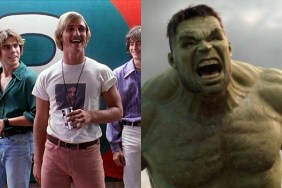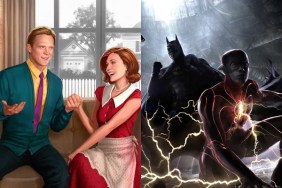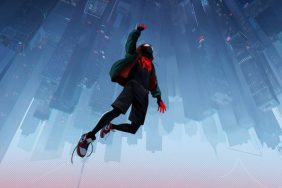Don’t make me Ang Lee. You wouldn’t like me when I’m Ang Lee.
Ang Lee’s 2003 non-superhero film Hulk came early in the now-long-winded comic-movie boom, only just cashing in on the ever-growing Marvel craze carried by films like Spider-Man 2 and X2: X-Men United. Lee was openly not a fan of comic books, and audiences – at the time – were eager to see how he would handle comic book material. And audiences came in droves. Hulk has earned a whopping $132 million to date. It was also critically lauded by many a reviewer, although it holds a largely average 62% “fresh” rating on Rotten Tomatoes.
But since its release, audiences have turned sour on the film, calling it a garish misstep in the superhero cinematic canon. Indeed, the production company that owned the Hulk character picked up on the ever-increasing bad vibes to the point of remaking the film entirely, eschewing the 2003 original, and producing a far less interesting actioner called The Incredible Hulk (which has – to put it into perspective – made almost the same amount of money, and was only slightly higher rated). The vitriol against Ang Lee’s hit film quickly grew to epidemic proportions, and nowadays, people regard it as an embarrassment at best, and one of the worst superhero films ever made at worst. No one has anything kind to say about it anymore, and if they do, it’s always a heavily qualified statement.
Well, my friend, we here at Trolling deliberately stand in opposition to your hatred, defending everything that you think sucks. And we feel that Hulk is hugely maligned, certainly underrated, and might even be a great movie. Indeed, we’d like to unashamedly declare that Ang Lee’s Hulk RULES! Here are some reasons why I’m right and you’re wrong.
True, there is a rather silly climax to the film wherein the Hulk fights a lake made of his father (it only kind of makes sense in the context of the film), and I can understand why some people might no like Lee’s leisurely pacing. But a lack of mayhem or a true-to-comics source material supervillain would not have improved this. I’ve been saying this for years: Fidelity to the source material is not a virtue unto itself. What Lee did was take a pop culture figure that millions know (or at least kind of know) and get to its heart. He made an interesting film that has more ideas – and more to say – than any other Marvel film to date.
Until next week, let the hate mail flow.
Witney Seibold is the head film critic for Nerdist, and a contributor on the CraveOnline Film Channel, and co-host of The B-Movies Podcast. You can read his weekly articles Trolling, and The Series Project, and follow him on “Twitter” at @WitneySeibold, where he is slowly losing his mind.
Ang Lee's Hulk RULES!
-
It Made the Hulk Interesting

Let's face it: The Hulk isn't too interesting a character. Bruce Banner may be, but the Hulk isn't. Bruce Banner is essentially the same character as Lyle Talbot from The Wolf Man, but instead of becoming a killer furry beast at night, he becomes a giant when he's angered. In most versions of this character – on TV or in comics – the Hulk was just an angry destructive monster. This Hulk was also a destructive monster, but there was also a level of complexity and introspection in this version that had previously be absent. This Hulk visits his girlfriend, flees, has flashbacks, and we get a sense of who the beast is beyond his smashy smashy habits. Ang Lee did that.
-
It's Actually About Something

Too few action movies have any sort of over-arching theme or message, other than the usual, boring “good vs. evil” fistfights that mark the genre. Hulk actually eschews a lot of common action movie ideas to bring us an actual tale. Hulk is an inter-generational story. It's about living down the legacy of rage left by your parents. It is, at its very heart, a symbolic film about parental abuse. Bruce Banner isn't just a guy with a temper in this version. He actually has reasons to be angry. Imagine that! Giving a rage monster an emotional background, rather than a contrived, plot-driven character quirk.
-
New Perspectives on The Hulk

I think people who aren't fans of comic books may be better suited to making movies based on them. They're not going to be slaves to the source material, and they won't get lost in the already-established mythology, allowing them to explore the character in a fresh way, getting to the heart of what the character is really about. Tim Burton brought such a strong, original note to Batman (not slavishly devoted to the comics) in 1989, that it actually influenced how the character would be seen for many years. Ang Lee did the same. He looked at the Hulk, and rather than concerning himself with what a fan would focus on, he explored a new angle. And a new angle is greatly appreciated in adapting something like the Hulk who is, as I said above, a not-very-interesting character. A fresh perspective was needed.
-
It Looks Great

Hulk is bright, open, clear, and slick. It's colorful and active. Ang Lee controversially included occasionally visual wipes throughout his film, denoting the space in between the comic book panels. Some fans found this choice distasteful, feeling it left the movie feeling too artificial. I think it allowed the old-timey Jack Kirby-Stan Lee aesthetic to leak into the movie. It was an aesthetic that hovered in between naturalism and outright comic book mayhem. The artificiality was a good choice, and it's a heck of a sight better than the drab, muddy ugliness of Incredible Hulk.
-
The Hulk Also Looks Cool

Ang Lee himself played the motion capture Hulk, giving the monster some interestingly balletic movements. This Hulk was large and actually felt large. He seemed to actually take up space, and stumbled as if he wasn't used to his new, larger body. He wasn't just a truck with feet. He was a humane creature that actually felt like a real being, rather than a dull, fist-pumping on-screen avatar, as he did in the proceeding two movies to feature him.
-
Too Good for Comics

I think the ultimate reason most audiences rejected Hulk was ironically the very reason that made it good: It wasn't a superhero movie. I think most audiences wanted (in retrospect, anyway) to see a version of the Hulk wherein he beats up bad guys and saves the girl. Ang Lee's Hulk was more about Bruce Banner wrestling with his inner demons, and coming to peace with his father. It wasn't a superhero movie in the least. It was so interested in the actual ideas behind the character, it totally transcended the genre, giving us something so fresh and original, fanboys couldn't abide by the changes. I can't even call Hulk a superhero movie, even though the Hulk is one of Marvel's more well-known character. It's a sci-fi drama. And that makes it better.









